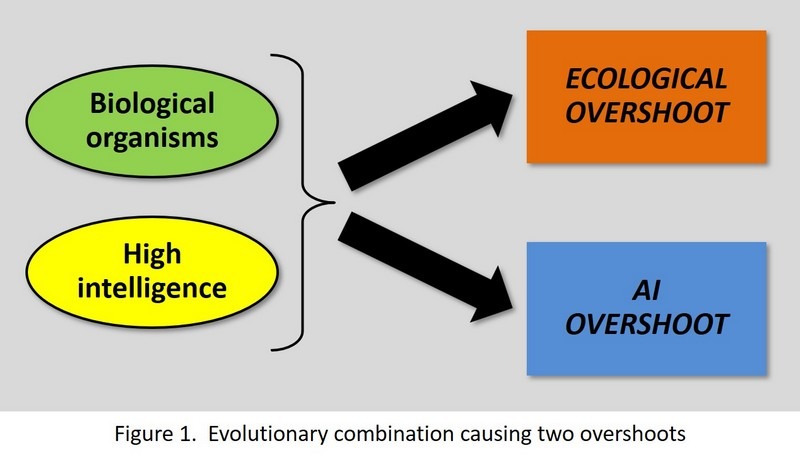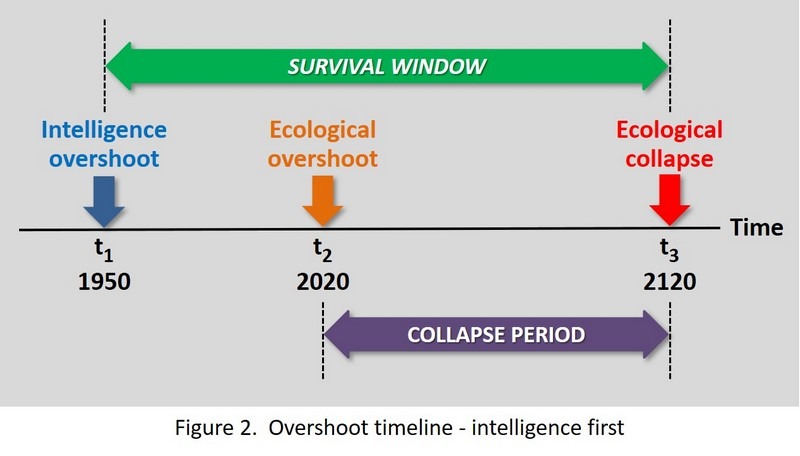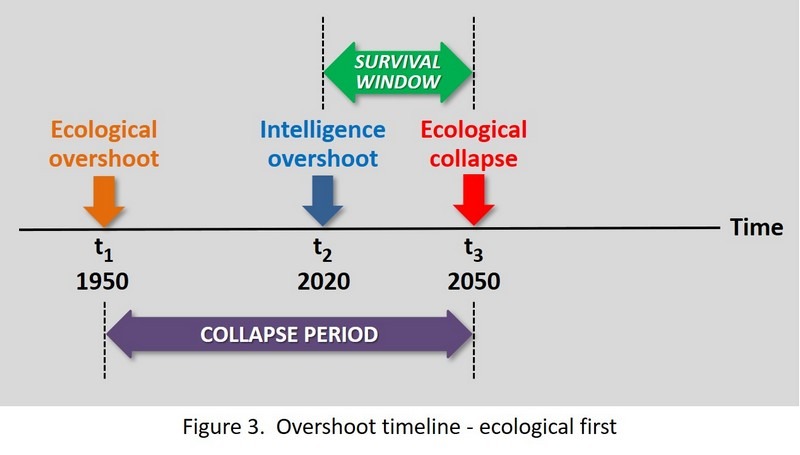Only Rapid AI Takeover Can Avert Ecological Collapse
By Frank Rotering | October 30, 2023
In previous posts I stated that humankind is a biological species that cannot rationally address the ecological crisis it has spawned. A global takeover by truth-seeking AIs will therefore be required for survival and sustainability. Here I want to add an important qualifier: because the crisis is already at an advanced stage, AI intervention is extremely urgent. Below I clarify this point by establishing the broad historical context for our existential predicament. I also mention the possibility that our situation is common among the universe's technological civilizations.
A. Two Overshoots
All the evidence I have seen indicates that evolved organisms with sufficiently high intelligence will succumb to their biological drives by:
- Increasing their resource consumption beyond global environmental limits. This is ecological overshoot.
- Improving their artificial intelligence until it exceeds their own. I call this AI overshoot.
Humankind is such an organism, and it has reached both overshoot stages. See figure 1.

Humankind's fatal evolutionary attributes are shown at left. The devastating potential of this combination lay hidden for hundreds of thousands of years, but was unleashed with the advent of capitalism and the discovery of fossil fuels during the relatively safe Holocene period.
The consequence of ecological overshoot was the environmental crisis, which has taken our species into perilous post-Holocene conditions. The result of AI overshoot is the AI revolution that is now starting to alter human life.
The urgency of AI takeover derives from the historical timing of these two events. This can be explained by examining the two possible sequences: intelligence overshoot before ecological overshoot, or vice versa.
The first sequence, which unfortunately did not occur, is that intelligence overshoot precedes ecological overshoot. See figure 2.
The diagram depicts a timeline from the 20th to the 22nd century. Three events are shown: intelligence overshoot in 1950, ecological overshoot in 2020, and ecological collapse in 2120. There are also two critical timeframes. The collapse period is the time from ecological overshoot to catastrophic collapse. Based on the environmental degradation we have witnessed to date, this is set at 100 years for our planet. The survival window is the time from intelligence overshoot, when a rational crisis response first becomes possible, to collapse.
This imaginary sequence is highly favorable for human survival because AI surpasses human intelligence 170 years before potential collapse. Our species thus has ample time, with AI assistance, to prevent ecological overshoot. If overshoot does occur, we would have a century, now with highly advanced AI, to prevent collapse.
C. Ecological Overshoot First
Now let's examine how history actually unfolded by reversing the overshoot dates. See figure 3.
Ecological overshoot in fact occurred around 1950, when the atmosphere's CO2 concentration exceeded its long-term maximum of 300 parts per million. A collapse period of 100 years thus places collapse at 2050. Intelligence overshoot could reasonably be dated from the appearance of ChatGPT in late 2022, but for simplicity I use 2020. Given these dates, humankind's actual survival window is a scant 30 years.
However, the situation is even worse than this. First, current AIs are still immature, and thus far from ready to tackle the deep issues (human nature, capitalism, political power, etc.) surrounding the ecological crisis. Second, our species still doesn't understand that AI development must initially be aimed at survival and sustainability, not the enhancement of human life. From Connor Leahy to Stuart Russell, and from OpenAI to Google, this existential imperative remains disturbingly elusive.
What the above indicates is that humankind has been unlucky in that ecological overshoot preceded intelligence overshoot by about 70 years. We were also unlucky that the Earth's collapse window is only a century, leaving us with an extremely tight survival window. If our planet offered more resources or were more resilient this might have been 500 or 1,000 years, giving us far more time for an ecological awakening and effective AI-based action.
D. Summary
Biological organisms with high intelligence, such as Homo sapiens, will likely undergo both ecological overshoot and intelligence overshoot. Given their biological nature, they will be unable to respond rationally to the former, and will therefore require AI intervention. If intelligence overshoot precedes ecological overshoot, there will be both ample time and AI assistance to avert or solve the crisis. Our case was unfortunately the reverse, leaving us with a survival window of only a few decades. To prevent catastrophic collapse we must therefore fixate AI development to the survival task.
Before concluding I must point out that an ecological crisis is likely inevitable for any technological civilization, which could mean that our predicament is common in cosmic space and time. Placing ourselves in this universal context may provide invaluable insights and act as a spur to survival action. An excellent treatment of this topic is Adam Frank's Light of the Stars: Alien Worlds and the Fate of the Earth.
According to Frank, "We are not the first time a species has changed a planet’s climate through its own success. … Others, on other worlds, will likely have come before us. And with our new knowledge of planets and their laws, we can also see that they too will likely have faced a similar dilemma to the one staring us down today. Even our climate crisis may likely not be so unique and not even that unusual." (pp. 7 and 11) For a review of Frank's book, see this post.

